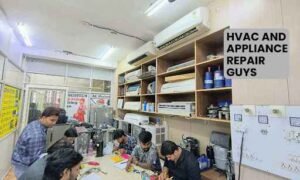Maintaining a comfortable home year-round relies heavily on the condition of your HVAC system. Many homeowners understand the importance of heating and cooling, but few consider how frequently maintenance should be scheduled. A tune-up is more than just a simple check—it ensures that the system is running efficiently, safely, and reliably. Waiting until something breaks down can be costly and inconvenient, especially during extreme weather. Regular tune-ups prevent unexpected breakdowns, improve energy efficiency, and extend the lifespan of your equipment. We will explore how often HVAC tune-ups should be scheduled and why timing plays a crucial role in maintaining your system in optimal condition.
Key Factors That Determine HVAC Tune-Up Frequency
- Seasonal Maintenance for Optimal Performance
Most HVAC professionals recommend scheduling tune-ups twice a year—once in the spring for your air conditioning and once in the fall for your heating system. This approach ensures each component is ready before heavy seasonal use. For instance, having your air conditioner checked in spring allows technicians to address refrigerant levels, coils, and airflow issues before the summer heat arrives. Similarly, a fall tune-up ensures your furnace is inspected, cleaned, and safe before the cold months hit.
Skipping these seasonal appointments can mean your system struggles when you need it most, leading to higher bills and possible mid-season breakdowns. Regular, seasonal maintenance also provides peace of mind, as you know your home will remain comfortable during extreme temperatures. Many homeowners rely on trusted HVAC companies in Tulsa to handle these timely tune-ups, ensuring the system is prepared before heavy use. Think of it like preparing a car before a long road trip—proper care ahead of time saves money and stress later.
- Considering the Age of Your System
The age of your HVAC system plays a significant role in how often tune-ups are needed. Newer systems may perform well with annual checkups, but older systems typically require closer monitoring. As components age, they wear down and lose efficiency, necessitating more frequent inspections. An HVAC unit that is 10 years old or more may benefit from tune-ups every six months, even if there are no visible issues.
Routine checks enable small problems to be addressed before they escalate into major repairs or a complete system replacement. Furthermore, older units tend to consume more energy; however, regular tune-ups can help minimize this by optimizing performance. By being proactive with maintenance as your system ages, you extend its usable life while avoiding sudden failures. If your system is approaching two decades of use, consistent tune-ups become even more vital, as they can help maximize the equipment’s value until a replacement becomes unavoidable.
- Usage Levels and Environmental Conditions
The frequency at which your HVAC system operates also determines the optimal frequency for tune-ups. Homes located in regions with extreme summers or winters, where the system runs nearly nonstop, may require more frequent maintenance than homes in moderate climates. For example, if you live in a hot, humid area where air conditioning is used most of the year, tuning up every six months may be ideal to keep it running efficiently. Environmental conditions also matter—homes near construction sites, high pollen areas, or regions with heavy dust may experience faster filter clogs and coil buildup.
This extra strain can cause the system to wear down prematurely without consistent maintenance. Families with pets may also notice their systems accumulating hair and dander, which can lead to blocked airflow and reduced efficiency. In these situations, seasonal tune-ups are not just recommended but essential. By adapting maintenance schedules to your environment and usage habits, you ensure your HVAC system is tailored to your lifestyle needs.
- Manufacturer’s Recommendations and Warranty Protection
Every HVAC system comes with manufacturer guidelines that outline the recommended frequency of maintenance. These recommendations are not arbitrary—they are based on the design, durability, and operational needs of the unit. Following these instructions helps you get the most out of your system while also maintaining your warranty. Many warranties require proof of regular maintenance, and failing to schedule tune-ups can void coverage. That means if something breaks down, you might have to pay out of pocket for costly repairs that otherwise would have been covered.
Scheduling tune-ups according to manufacturer requirements ensures you stay compliant while also keeping the system running at peak efficiency. Even if your HVAC unit is new, don’t make the mistake of skipping maintenance just because everything appears to be fine. Early care establishes a history of consistent upkeep, which pays off when your system begins to age and requires additional attention.
Determining how often to schedule HVAC tune-ups depends on several factors, including the age of your system, its frequency of use, environmental conditions, and manufacturer recommendations. While annual maintenance may be sufficient for newer or lightly used systems, many households benefit from tune-ups twice a year to prepare for seasonal demands. Regular maintenance not only keeps energy bills lower but also prevents costly breakdowns and extends the lifespan of your equipment. It enhances safety, improves indoor air quality, and ensures consistent comfort for your family.







